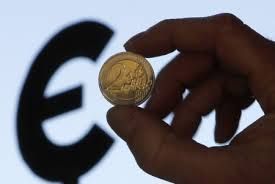 Foreign exchange markets reserved judgement on Greece's place in the euro and the overall solidity of the common currency project on Monday, prodding the euro less than half a percent lower after Greeks voted 'No' to further austerity.
Foreign exchange markets reserved judgement on Greece's place in the euro and the overall solidity of the common currency project on Monday, prodding the euro less than half a percent lower after Greeks voted 'No' to further austerity.
The euro had sunk below $1.10 in initial trade in Asia after a vote that a number of major banks said made a 'Grexit' the most likely option to end months of crisis and a cash crunch that has seen Greece's banks almost completely closed for a week.
But the common currency bounced quickly and in morning trade in Europe was down just 0.5 percent at $1.1057, given some help by the resignation of Greek Finance Minister Yanis Varufakis and holding well inside a range it has kept since the end of April.
That was similar to how the currency traded last Monday after the collapse of talks between euro zone leaders and Athens and reflected the uncertainty of many forex players about how much damage a Greek departure would actually do to the euro.
Some said they still saw the odds as very balanced on whether the two sides could come to a deal to avert that anyway.
"To me its all down to how (German Chancellor Angela) Merkel wants to play her hand. Varoufakis' departure tends to suggest softer negotiations," said Richard Benson, Co-Head of portfolio investments with currency fund managers Millennium Global in London.
Like a number of others, he noted that the outlook for the European economy was probably worsened by the uncertainty generated by the Greek crisis and that was likely to put more downward pressure on euro zone interest rates.
"The euro is coming back following the initial post-referendum drop, but this belies vulnerability in days ahead," said Josh O'Byrne, a London-based strategist with the FX market's largest banking player, Citi.
Another effect of an easier monetary policy outlook is to draw investors into core European government debt including German Bunds and some pointed to that as a short-term positive for the euro.
"For all the worry about Greece and the future of the euro zone, that is leading people to buy core European assets as a safe haven and that, ironically you might say, supports the euro," said Jane Foley, a strategist with Rabobank in London.
SWISS INTERVENTION?
The Swiss franc, normally a natural recipient of funds in search of a safe haven from the euro zone's troubles, was flat against the euro and a third of a percent lower against the dollar.
That prompted talk among dealers of renewed intervention by the Swiss National Bank.
The SNB, which confirmed last week it had been intervening to weaken the franc, as per its normal procedure declined to comment on Monday's speculation.
The euro skidded to a six-week low of 133.700 yen early in the Asian session, from 136.185 late on Friday, before rebounding to 135.355, down about 0.6 percent on the day.
"It seems to have been fairly well contained, at this stage.
"The moves have not been as dramatic as some anticipated," Mitul Kotecha, head of Asia-Pacific FX strategy for Barclays in Singapore.
"It does seem like a lot of investors are still sidelined, unwilling to take risk on at this stage."
Additional reporting by Lisa Twaronite in Tokyo












 © 2025
© 2025